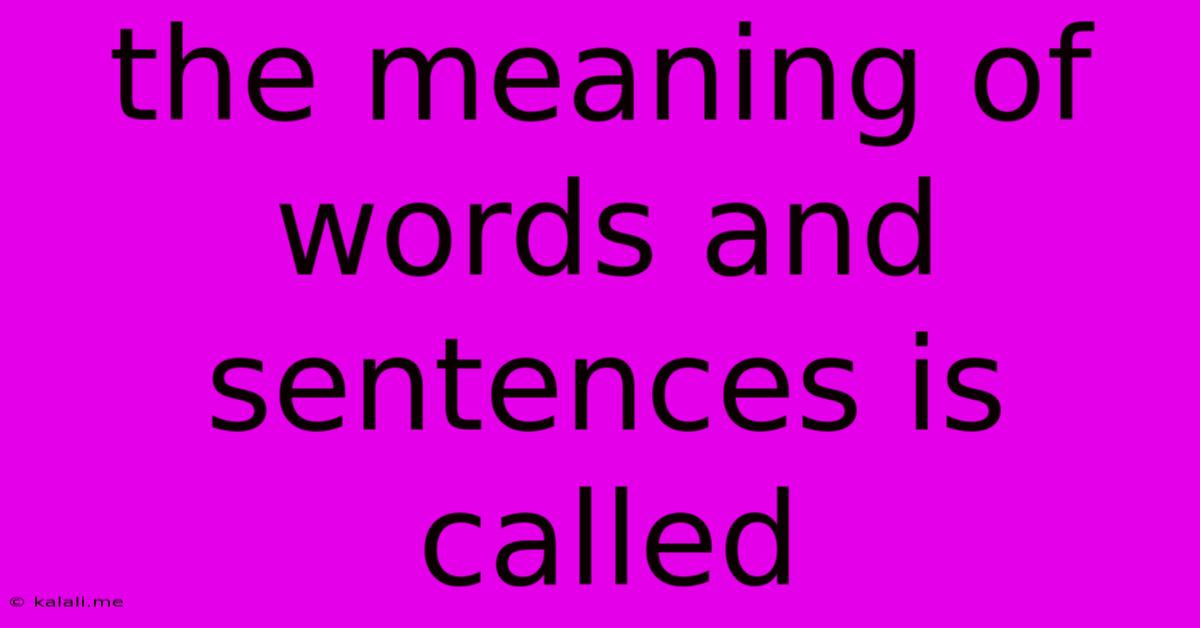The Meaning Of Words And Sentences Is Called
Kalali
Jun 15, 2025 · 3 min read

Table of Contents
The Meaning of Words and Sentences is Called Semantics
Understanding how we derive meaning from language is fundamental to communication. The study of meaning in language is called semantics. This article delves into the fascinating world of semantics, exploring how we unpack the meaning of words, phrases, and sentences, and the different levels at which meaning operates. We'll also touch upon the related fields of pragmatics and lexical semantics.
What is Semantics?
Semantics, at its core, is the branch of linguistics concerned with meaning. It explores how meaning is created, interpreted, and conveyed through language. This isn't just about defining individual words; it's about understanding how words combine to form phrases and sentences, and how those sentences contribute to larger communicative contexts. Think about the difference between "The cat sat on the mat" and "The mat sat on the cat." While both sentences use the same words, their meaning is drastically different due to the semantic relationships between the words.
Levels of Semantic Analysis
Semantics operates on several levels, each contributing to our overall understanding:
-
Lexical Semantics: This focuses on the meaning of individual words (lexemes) and their relationships to each other. It examines synonyms (words with similar meanings), antonyms (words with opposite meanings), and hyponyms (words that represent a category, e.g., "dog" is a hyponym of "animal"). Understanding lexical semantics helps clarify ambiguities and nuances in word choice.
-
Phrasal Semantics: This level deals with the meaning of phrases and how the meaning of individual words combines to create the meaning of the larger unit. For example, the phrase "running water" has a meaning different from just "running" or "water" alone. This involves understanding grammatical roles and relationships between words.
-
Sentential Semantics: This focuses on the meaning of complete sentences. It considers the truth conditions of sentences (whether a sentence is true or false), logical relationships between sentences (e.g., implication, contradiction), and the ways sentences can be ambiguous or paradoxical.
-
Discourse Semantics: This broader level examines how meaning is constructed across multiple sentences, in a conversation, text, or even a whole narrative. It considers how prior knowledge and context influence our interpretation of meaning.
Related Fields: Pragmatics
While closely related to semantics, pragmatics studies how context contributes to meaning. Semantics focuses on the literal meaning of words and sentences, while pragmatics considers the intended meaning, speaker's intent, and the influence of social context. For example, saying "It's cold in here" might mean "Please close the window" depending on the context.
The Importance of Understanding Semantics
A strong understanding of semantics is crucial in many fields:
-
Natural Language Processing (NLP): NLP relies heavily on semantic analysis to enable computers to understand and process human language.
-
Translation: Accurate translation requires a deep understanding of the semantic nuances of different languages.
-
Communication Studies: Understanding semantics helps analyze and improve communication effectiveness.
-
Legal Studies: Precise interpretation of legal texts relies on a thorough understanding of semantic principles.
In conclusion, semantics is the cornerstone of understanding meaning in language. By analyzing words, phrases, sentences, and discourse, we can unlock the complexities of human communication and apply this knowledge to a wide range of disciplines. The ability to precisely decipher meaning is vital, whether you're writing a compelling blog post, crafting a legal document, or simply having a conversation.
Latest Posts
Latest Posts
-
Least Common Multiple Of 15 And 40
Jun 15, 2025
-
Is University Of Minnesota Test Optional
Jun 15, 2025
-
Acids Turn Litmus Paper What Color
Jun 15, 2025
-
Difference Between Iteration And Recursion In C
Jun 15, 2025
-
Least Common Multiple Of 12 And 22
Jun 15, 2025
Related Post
Thank you for visiting our website which covers about The Meaning Of Words And Sentences Is Called . We hope the information provided has been useful to you. Feel free to contact us if you have any questions or need further assistance. See you next time and don't miss to bookmark.